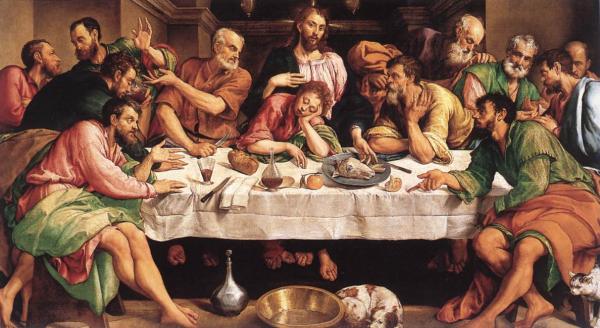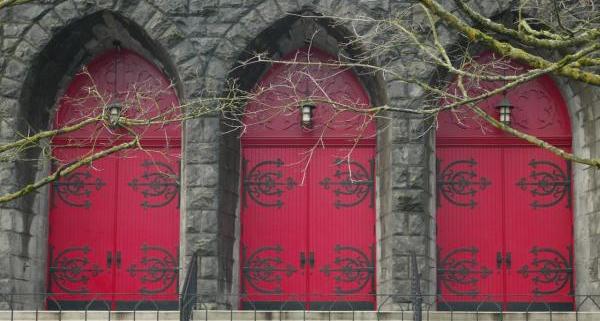Are Evangelicals going to try to break up families now?
Now that gays and lesbians can legally marry, with no borders issues or inconsistencies, and now that they can cultivate families with those marriages, how will Evangelicals deal with those families?
Many Evangelicals staunchly oppose those marriages, holding them to be contrary to God’s will and to the authority of Scripture. See the “Here We Stand” statement by over 100 evangelical leaders (a cursory read of the list shows the majority to be Souther Baptists, which is not surprising) for a recent example. The statement is published on Christianity Today magazine, which has become the outlet for the conservative backlash to LGBT equality.
What will happen when a gay or lesbian couple, or a family with gay or lesbian parents shows up at their nearby evangelical church and wants to participate–wants to, you know, be part of the church? What happens when they want to become members, or deacons, or Sunday School teachers, or youth volunteers, or greeters? What happens when LGBTQ families want to become a part of a local family of God?
We can get a hint about what might happen in Evangelical churches in Mark Galli’s recent editorial in the aforementioned Christianity Today.
Evangelicals, Galli urges, need to teach the “Christian sexual ethic” to LGBT couples who walk into their churches. And Evangelicals will need to “rethink” how they relate to them, what they will expect of them:
This certainly means thinking afresh about what we will and will not do when, for example, a gay married couple, seeking to draw closer to God, shows up in church and wants to get involved. It nearly goes without saying that we will welcome them unconditionally as we would anyone who walks in the door. But what does love look like in this particular instance? How much participation do we encourage before we ask them to adopt the Christian sexual ethic? Much of this depends on a church’s tradition and its beliefs about baptism, church membership, eldership, and so forth. But many evangelical churches do not have a denominatonal tradition to lean on and will need to think through these matters with fresh urgency.
One issue that demands special attention is divorce and remarriage. The Bible has a fair amount to say about marriage (as much or more than it does on homosexuality), and yet the evangelical church has become lax about honoring the marriage vow. We use the word grace in a cheap way to avoid the awkward tough love of church discipline. Such inconsistency has been a major stumbling block for those outside the church. This does not mean we forbid all divorce, nor all remarriage. It does mean we evangelicals need to come to consensus about what constitutes legitimate biblical grounds for divorce and for remarriage, and maybe even create a covenant amongst ourselves that will help us to abide by our convictions on this matter.
First note the obvious contrast between “it goes without saying that we will welcome them unconditionally,” and the issue of conditions that is immediately raised in the second part of the that sentence (“what will love look like in this particular instance?”), Granted, Galli is being pretty vague here in the implications he raises. But the ambiguity has a foreboding tone. Reading between the lines, it certainly seems that he’s suggesting divorce might be the proper “biblical” pathway for married, gay couples (since they are living in sin).
Would submission to the “biblical sexual ethic” require the dissolution of a happy marriage and the breakup of a healthy family?
Should a pastor counsel a happily married gay couple to seek a divorce? An annulment? Put their child or children up for adoption? In foster care? Or split them up among the newly separated parents?
Later in the article, Galli suggests this Evangelicals have been handed an opportunity to show that they are not a threat to gay people, since the political issue has been legally determined. Perhaps the SCOTUS decision might relax the pressure and ease the tension between Evangelicals and LBBTQ people. No reason for hostility now, right?
But what he gives with the left hand he takes back with the right.
If Evangelicals are to view gay marriages, and their families or would-be-families, as inherently and irredeemably broken, invalidated, and requiring separation in order to live out the “true Christian ethic,” then those Evangelicals are very much a threat to any gay or lesbian couple–and their families–who walks into the door of their church.
They will not stay. They will run far away. As they should.
Will conservative Evangelicals, up to this point the “pro-family” lobby group par excellence, suddenly become “anti-family,” or at least a threat to existing LGBTQ families?
They will insist they are not “anti-family,” but that gay marriages are not real marriages, and therefore their families are not real families.
But a lot rides on that claim. A lot rides on a a theological ethic and an interpretive scaffolding that is increasingly perceived as unjustifiable and untenable. See James McGrath’s short piece, “Bible proof-texting is an Unwinnable Game.” (And look for my coming blog post on the issue of theology and biblical interpretation with respect to this issue–the next piece in my Leaving Evangelicalism series).
Granted, conservative evangelicals didn’t ask for the conundrum they now find themselves in. But in any case, this is the way things are, and “here they stand.” I know that many Evangelicals will follow the way of love, of embrace, and of hospitality, and reject the dead-end of traditionalist moralism. Perhaps their witness can win out over the others, and Evangelicals can continue to be pro-family–but pro-all-families.
Stay in the loop–Like/follow the Unsystematic Theology Facebook page for more posts and discussion on theology and society












